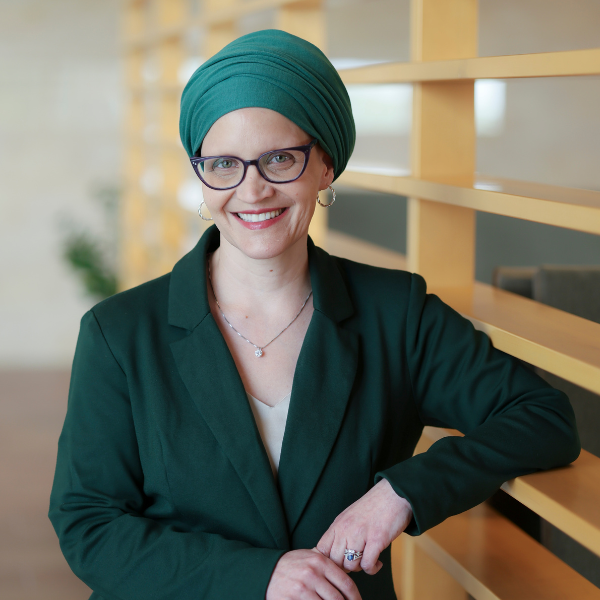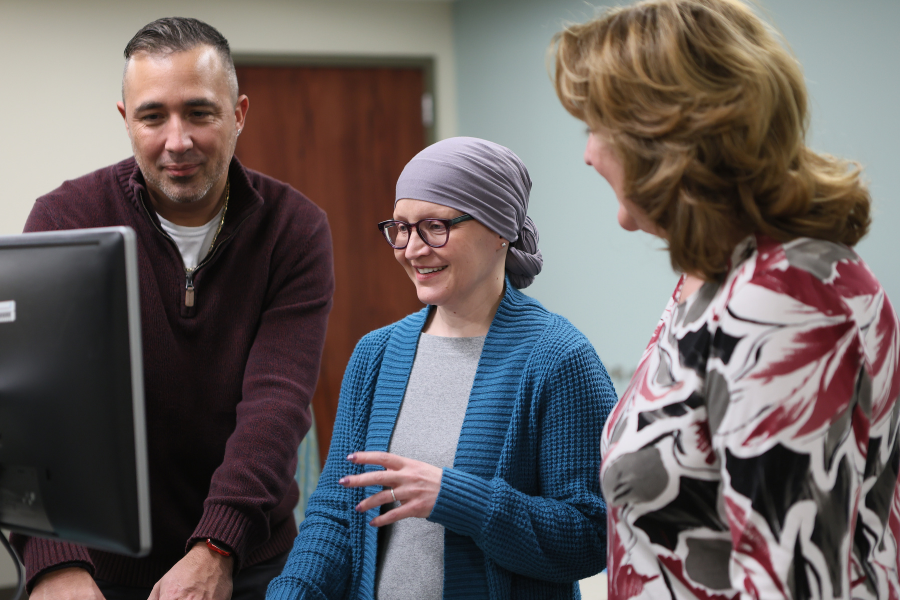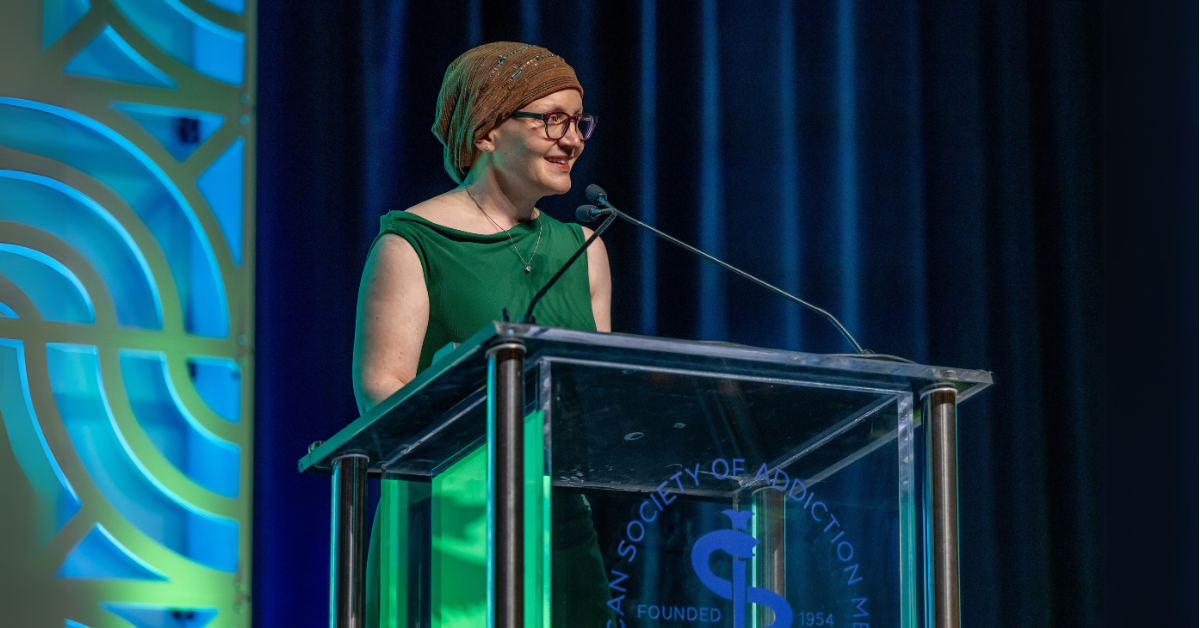New Leadership Role Continues Advocacy Work for Addiction Medicine Physician
June 16, 2025
Cara Poland appointed vice president of the American Society of Addiction Medicine
 After a morning of Zoom meetings, a phone call to Senator Elissa Slotkin’s office and training medical students, Cara Poland, MD, MEd, still has plenty of energy to juggle her many roles. Poland is an associate professor with MSU College of Human Medicine and a physician at Trinity Health driven to advance addiction treatment through her clinical practice, teaching and advocacy.
After a morning of Zoom meetings, a phone call to Senator Elissa Slotkin’s office and training medical students, Cara Poland, MD, MEd, still has plenty of energy to juggle her many roles. Poland is an associate professor with MSU College of Human Medicine and a physician at Trinity Health driven to advance addiction treatment through her clinical practice, teaching and advocacy.
“I like to tell my daughter I’m the Taylor Swift of addiction medicine but I’m in my chauffeur era,” she joked, referring to the coexistence of her nationally recognized work in addiction medicine advocacy and the never-ending transport needs of her two tween children.
In a way, this dual commitment to family and to advocacy work is representative of Poland’s entire life. Her passion for eliminating the stigma that surrounds addiction was ignited by the death of her brother, Max, more than a decade ago. As she shared on stage at TEDxMSU in 2024: “The opposite of stigma is empathy.”
Poland has been interviewed by a number of national news outlets and podcasters, and recently recognized with several awards, but this did not come quickly or easily. Rather, this level of attention is a culmination of countless hours spent on the phone with insurance companies, days spent teaching medical students about the field of addiction medicine, and years spent wrestling with state and federal policy loopholes that left portions of the population without needed health care.
 “If you love it, you make time for it,” Poland said of juggling advocacy work alongside her clinical and teaching roles. “This is absolutely unpaid work.”
“If you love it, you make time for it,” Poland said of juggling advocacy work alongside her clinical and teaching roles. “This is absolutely unpaid work.”
Poland’s years of unpaid work are the reason that Michigan has moved toward mental health and addiction parity. The 2008 federal Mental Health Parity and Addiction Equity Act (MHPAEA) decreed that health insurers are required to provide coverage for mental health and addiction care that is comparable to coverage for medical and surgical needs.
But when she was recruited by a university in 2013 to start an addiction clinic, she realized there was no way for physicians to bill Medicaid for reimbursement of addiction services. Most clinics were relying on volunteer hours from physicians who worked other jobs, an unsustainable model that didn’t provide any stability for patients.
Authorities more or less shrugged their shoulders when she pointed out the federal violation. She hit dead end after dead end trying to figure out who could affect change in this area until she determined it was up to her. After a small win in January 2014–the ability to bill for “opioid use disorder not otherwise specified” she continued to fight in what she calls her “seven-year war” for full coverage.
“I was talking about it with anyone who would listen, even at my kids’ swim lessons,” Poland shared with a laugh. “I was the gnat buzz buzz buzzing.”
All of that buzzing paid off when, in August of 2021, Michigan Medicaid finally expanded reimbursement to cover both opioid and alcohol use disorders. The inclusion of alcohol use disorder coverage was especially important to Poland as that is what her brother Max struggled with.
More recently, in 2024, Medicaid came out with two more policies that expanded substance use care even further. Having overcome these barriers, Poland continues to focus on the future in her new position as vice president of the American Society of Addiction Medicine (ASAM). “We are always asking, ‘How are we going to improve?’” she said. “If we lose sight of that, we are lost.”

She was recently awarded the 2025 ASAM Award for her contributions to the organization and her deep commitment to the field of addiction medicine, advocacy, and education. Beyond her policy work, she leads the Michigan-based program MI CARES to equip future physicians for addiction care no matter their chosen field. Over 20,000 health care learners have benefitted from these programs to date, some of whom go on to become board certified in addiction medicine.
The Betty Ford Award from the Association for Multidisciplinary Education and Research in Substance use and Addiction (AMERSA) is Poland’s latest honor. This award focuses on individuals who have made an impact in the field of alcohol and substance use with special regard to women’s issues. Poland’s work as an addiction physician within the context of an OB-GYN clinic made her the perfect fit for this award.
This aspect of her work was featured in the New York Times in June of 2024. The article details how Poland takes an unconventional and humble approach to health care by sitting on the floor when she interacts with patients, shifting the power balance in the room and dispelling some of the stigma that surrounds substance use. “Health care is the largest source of stigma in their [pregnant patients’] lives,” Poland said. “If you’re not unkind, you’re a breath of fresh air.”
Poland is certainly far more than that. While recent accolades and awards are gratifying, she knows that this is simply a bright spot in a long life dedicated to serving some of the most stigmatized, underserved individuals in our communities. “There is a lot of uncertainty right now,” she said. But she is undeterred: “I will always be here with my eye on the health, safety, and wellbeing of the citizens at the local, state, and national levels. Together, we can move mountains.”
By Kayla Crum, RN | Media contact: Emily Linnert
Close the Gap in Addiction Medicine ![]()
More than 40 million people struggle with substance user disorders, yet fewer than 7,000 physicians have received adequate addiction training. Help support the MSU’s expanded addiction program and Dr. Poland’s work to radically transform substance use disorder treatment and care.


